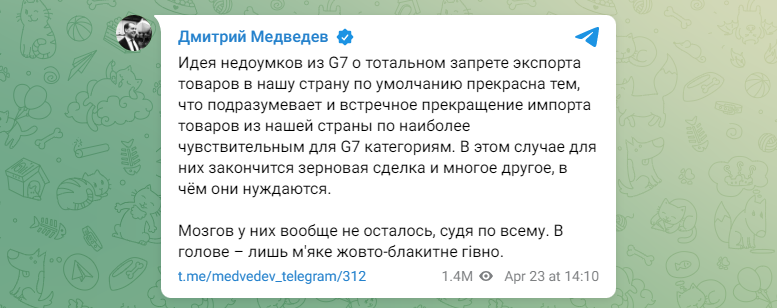
The deal was extended on March 18 under serious tensions. On April 20, Bloomberg reported that G7 officials were considering an outright ban on most exports to Russia ahead of a leadership summit in Japan in May. The new approach would flip the existing sanctions regime around, with all exports banned unless exempted, whereas all exports are currently allowed unless sanctioned. However, it was noted that food and medicine would likely stay exempted.
In reaction, Deputy Chair of the Russian Security Council and former President Dmitry Medvedev threatened the G7 with the cessation of Russian exports of the most sensitive items to West, including blocking the Black Sea Grain Initiative. He wrote that G7 officials have had their brains replaced with "soft blue and yellow shit" (tartly written in Ukrainian).

The matter has not been gone beyond Medvedev's traditionally obscene comments on Telegram. The Russian Defense Ministry accused Ukraine of using the port of Odesa (from which Ukrainian grain is exported) to launch an unmanned surface vehicle attack on Russia's Black Sea Fleet stationed in Sevastopol on March 23 and April 24. The Ministry's statement announced that Russia was suspending its partiicpation in the deal. Ukrainian officials have not commented on the accusations of using Odesa as a launching point for maritime drone attacks.
It is worth remembering that Russia has already backed out of the Grain Initiative once in October 2022 after blaming Ukraine for attacks on its Black Sea Fleet, but returned after several days after allegedly receiving certain security assurances. Ukrainian presidential adviser Mykhailo Podolyak stated at the time that Russia changed its mind because they realized that the grain corridor could continue working even without the Kremlin's participation.
The world is now preoccupied with these developments. In a recent communique, G7 agriculture ministers called for the "extension, full implementation and expansion" of the deal to export Ukrainian grain through the Black Sea.
UN Secretary-General Antonio Guterres presented a letter to Russian President Vladimir Putin via Foreign Minister Sergei Lavrov proposing to improve, extend, and expand the deal while also taking into account Russia's concerns about its own grain and fertilizer exports. Moscow promised to study it, but Lavrov's attitude toward the matter was made clear after a meeting of the UN Security Council in whichhe presided. He was asked by a Reuters journalist whether the grain deal was dead, and responded by telling the journalist that she had a nice dress.

Ukrainian ambassador to Turkey Vasyl Bodnar stated that Ukraine needs to prepare for the possibility of Russia blocking the deal when it expires on May 18, and think of alternative options for agricultural exports.
This new round of tensions over the Black Sea Grain Initiative shows that while Russia occupies Ukrainian territory, no one can be sure of the stability of Ukrainian food exports. Russia will always find a pretext to blackmail the world and stop Ukrainian and international attempts to repel Russia's illegal invasion.
